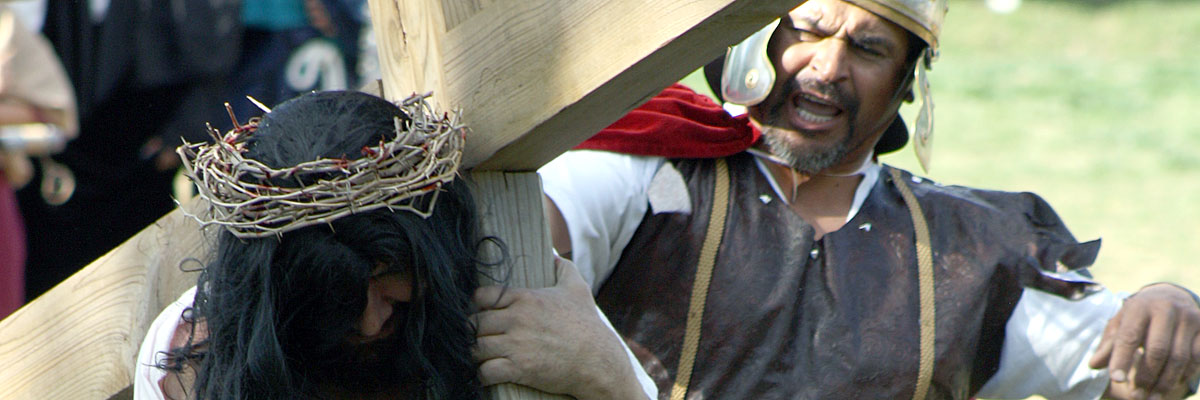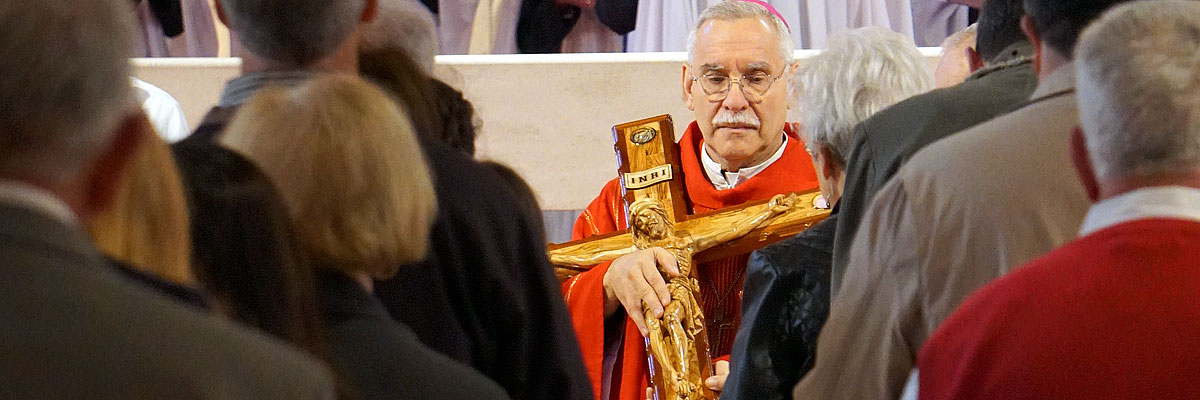Official Website of the
Catholic Diocese of Little Rock
Palm Sunday 2020
Published: April 5, 2020
Bishop Anthony B. Taylor preached the following homily at the Diocese of Little Rock House of Formation in Little Rock on Sunday, April 5, 2020.

Bishop Taylor
If you have read the story of the life and death of Blessed Stanley Rother, you may remember that he returned to Guatemala on the Saturday of Palm Sunday weekend. He had taken refuge in Oklahoma in January because his life was in immediate danger, but couldn’t stay away because, as he said, “The shepherd cannot run when the wolf threatens his flock.”
But among the things you may not have noticed are the precautions he took in an attempt to make sure that his very presence did not put the flock in greater danger, them being caught up as bystanders, collateral victims of whatever harm the persecutors planned to do to him. His two months back in Oklahoma was sort of like his own personal agony in the garden, during which he thought through all of this, praying in effect “Father, if it is possible, let this cup pass from me; yet, not as I will, but as you will.”
And so Father Rother returned for Holy Week, uniting what turned out to be his own approaching passion and death to that of Jesus in the liturgical celebration of Palm Sunday, which is also called Passion Sunday, and then Holy Thursday, Good Friday and Easter. It is significant for our purposes today to notice that during Holy Week there in 1981 attendance at Mass in Santiago Atitlán was much less than usual. The Church may have been virtually empty. People were afraid, people were disappearing and the words of Jesus from the cross: “My God, why have you forsaken me” resonated deeply with their own experience of feeling threatened and helpless.
So today, we lift up to the Lord ourselves and all of those people who are living in fear throughout the world, especially those who are suffering and dying unaccompanied. Jesus at least was accompanied by John, his mother and a few women … and even so, he felt forsaken. You and I are not forsaken. Our Savior is with us and so we place our trust in him.
And isn’t that how we feel today as well? The COVID-19 pandemic has left us feeling threatened and helpless. And, though for a very different reason, our churches are virtually empty too. But unlike Jesus’ disciples in today’s Gospel who, by abandoning Jesus, could flee the danger, there is nowhere for us to go … and of course we are much safer with Jesus than without him!
We can take steps to reduce the risk, like Father Rother who changed the locks and cancelled all parish meetings in order to protect himself and his parishioners, but there is only so much anyone can do. We have taken prudent measures in an attempt to manage the threat — suspended public Masses and other gatherings, and provided people with spiritual resources, including live streaming Mass over the Internet since for now people cannot attend in person.
And yet access to God is not cut off, any more than it was cut off that fateful Friday in which direct access to Jesus was cut off through is death. That week began with palms raised high to acclaim the arrival in Jerusalem of our Savior and continued on Thursday with the first Passover meal of the New Covenant, and then on Friday the crisis hit. The Lord was taken from us — 2,000 years ago, physically; this year, sacramentally in response to a very different threat.
But in both cases, as it turns out, only temporarily. Two thousand years ago the disciples thought that the separation was going to be permanent but it only lasted three days. Jesus had tried to prepare them, but how do you prepare someone for something like this? In our case, we know that the separation is just temporary. It may last a number of weeks or even months, and again, how do you prepare someone for something like the COVID-19 threat? It came to us from nowhere.
The answer is, “you don’t” … you can’t. But what we can do is simply put our trust in the Lord. Just like 2,000 years ago, the victory has already been won. The disciples couldn’t see it at the time and we ourselves, looking to the future have no idea how this is all going to unfold — or for that matter, any other adversities in our life. But what we do know is that God uses adversity to save us, to draw us to himself and to teach us to place our trust in him.
So today, we lift up to the Lord ourselves and all of those people who are living in fear throughout the world, especially those who are suffering and dying unaccompanied. Jesus at least was accompanied by John, his mother and a few women … and even so, he felt forsaken. You and I are not forsaken. Our Savior is with us and so we place our trust in him.






